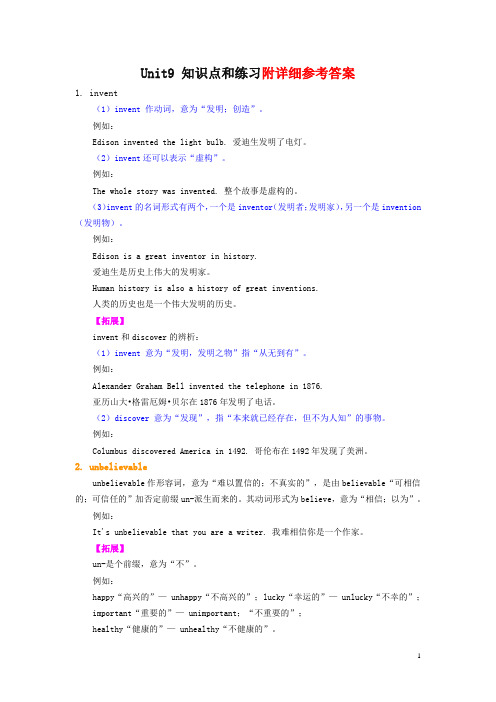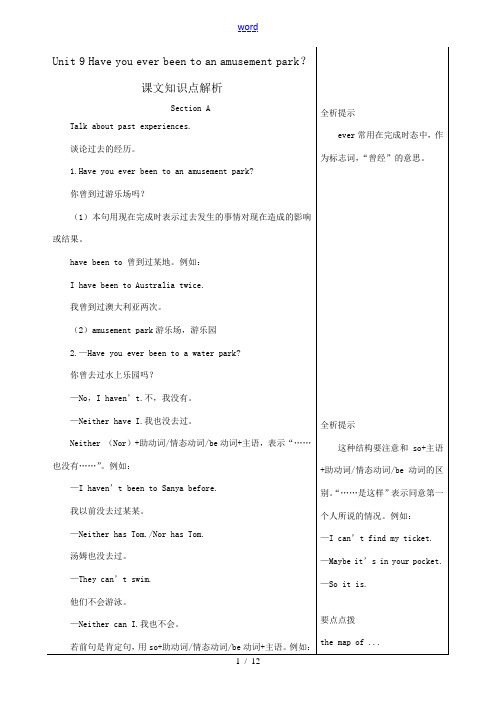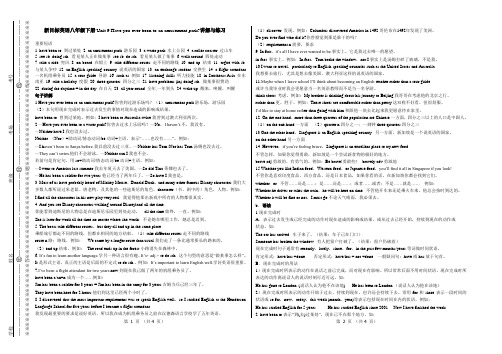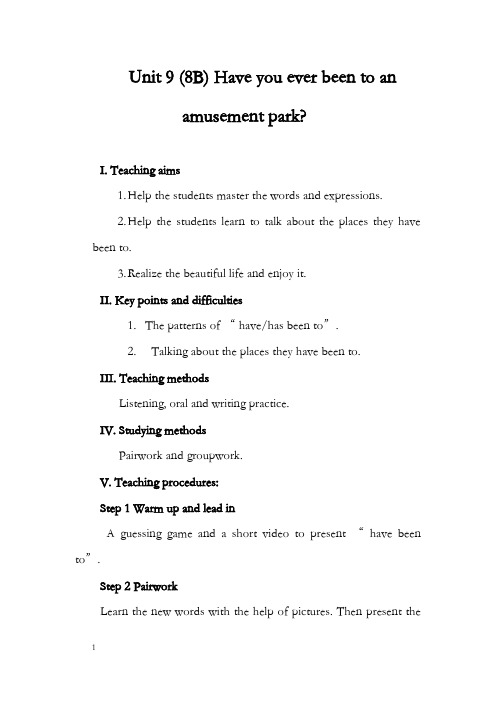新目标初中英语八年级下册《Unit 9 Have you ever been to an amusement park》课件2
- 格式:ppt
- 大小:603.00 KB
- 文档页数:10

Unit 9 Have you ever been to a museum?教学目标:1 语言目标:1)能正确使用现在完成时表示是否去过某地( Present perfect tensewith been2)能正确使用现在完成时提问是否曾经做过某事( Present perfecttense with ever)2 技能目标:1)通过上下文、词性和构词法等推测词义2)通过做读书笔记来巩固学习3 情感目标:1)了解各类博物馆、主题公园和名胜古迹2)了解新加坡的语言、食物、气候和特色教学重点单词短语:camera, unbelievable, progress, rapid, unusual, toilet, encourage social, peaceful, perfect, itself, collect, German, ride, province,thousand, safe, simply,fear, whether, Indian, Japanese, fox, whenever,spring,a couple of, thousands of, on the one hand,on the other hand,all year round句子:1.Have you ever been to a science museum?2.I've recently been to a very unusual museum in India.3.Have you ever tried Chinese food outside of China?Yes. I have. /No, I haven' t.I've never been there.4.A: Have you ever been to a science museum? oB: Yes. I have./No, I haven't.5.A: Have you ever visited the space museum?B: Yes, I have. I went there last year. /No, I havent6.A: I've never been to a water park.B: Me neither.语法:Present perfect tense with everPresent perfect tense with never教学难点:1.Present perfect tense with ever and never2.能谈论有趣的地方( Fun places)和过去的经历( Talk about past experiences)课时划分Period 1 Section A 1 (1a – 2d)Period 2 Section A 2 (3a-3c)Period 3 Section A 3 (Grammar focus-4c)Period 4 Section B 1 (1a-1e)Period 5 Section B 2 (2a-2e)Period 6 Section B 3 (3a-Self check)Period 1 Section A 1 (1a-2d)教学目标1. Knowledge and Ability Objects(1) Key vocabulary: amusement; neither(2) Listening practice.(3) Target language:1.Lets' go somewhere different today.2.Have you ever been to…? Yes, I have./ No, I haven't.3.How about/what about…?4.How are we going to get there?5.We can take the subway/…(4) To train students' listening and speaking skills.2. Method Objects in Teaching(1) Scene teaching method.(2) Listening and speaking methods.(3) Pair work.3. Sensibility and ValueTo be interested in taking part in all kinds of activities in English class.Teaching Key Points1. Key vocabulary in this period.2. Target language in this period.Teaching DifficultyMake conversations freely using the target language.教学过程Teaching Procedures课前三分钟:中国共产党党史党的一大:中国共产党诞生1921年,中国共产党在上海召开第一次全国代表大会,宣告了中国共产党的成立。

Unit9 知识点和练习附详细参考答案1. invent(1)invent 作动词,意为“发明;创造”。
例如:Edison invented the light bulb. 爱迪生发明了电灯。
(2)invent还可以表示“虚构”。
例如:The whole story was invented. 整个故事是虚构的。
(3)invent的名词形式有两个,一个是inventor(发明者;发明家),另一个是invention (发明物)。
例如:Edison is a great inventor in history.爱迪生是历史上伟大的发明家。
Human history is also a history of great inventions.人类的历史也是一个伟大发明的历史。
【拓展】invent和discover的辨析:(1)invent 意为“发明,发明之物”指“从无到有”。
例如:Alexander Graham Bell invented the telephone in 1876.亚历山大•格雷厄姆•贝尔在1876年发明了电话。
(2)discover 意为“发现”,指“本来就已经存在,但不为人知”的事物。
例如:Columbus discovered America in 1492. 哥伦布在1492年发现了美洲。
2. unbelievableunbelievable作形容词,意为“难以置信的;不真实的”,是由believable“可相信的;可信任的”加否定前缀un-派生而来的。
其动词形式为believe,意为“相信;以为”。
例如:It's unbelievable that you are a writer. 我难相信你是一个作家。
【拓展】un-是个前缀,意为“不”。
例如:happy“高兴的”— unhappy“不高兴的”;lucky“幸运的”— unlucky“不幸的”;important“重要的”— unimportant;“不重要的”;healthy“健康的”— unhealthy“不健康的”。

新目标八年级下册Unit 9 Have you ever been to a museum ?讲义一、重点单词1. amusement n. 娱乐; 游戏2. somewhere adv. 在某处; 到某处3. camera n. 照相机; 摄影机; 摄像机4. invention n. 发明物5. invent v. 发明; 创造1. unbelievable adj. 难以置信的; 不真实的2. progress n. 进步; 进展3. rapid adj. 迅速的; 快速的4. unusual adj. 特别的; 不寻常的5. toilet n. 坐便器; 厕所6. encourage v. 鼓励7. social adj. 社会的8. peaceful adj. 和平的; 安宁的9. performance n. 表演; 演出10. perfect adj. 完美的; 完全的11. itself pron.(it的反身代词) 它自己12. collect v. 收集; 采集13. German adj. 德国的; 德语的; 德国人的n. 德语; 德国人14. theme n. 主题15. ride n. 供乘骑的游乐设施; 短途旅程16. province n. 省份17. simply adv. 仅仅; 只; 不过18. fear v. & n. 害怕; 惧怕19. whether conj. 不管......;还是); 或者......(或者); 是否20. Indian adj.印度的 n. 印度人21. Japanese adj.;日本的; 日本人的; 日语的n. 日本人; 日语22. equator n. 赤道23. whenever conj. 在任何......时候; 无论何时24. spring n. 春天25. mostly adv. 主要地; 通常26. location n. 地点; 位置二、短语归纳1.at night在夜晚2.in a more natural environment在一个更加自然的环境中3.all year round 全年4.be far from 离……远5.in the dark 在黑暗中6.in the past 在过去7.have been to sp. 去过某地8.science museum 科学博物馆9.history museum 历史博物馆10.amusement park 游乐园11.go somewhere different 去不同的地方12.go skating 去滑冰13.take the subway 坐地铁14.a great way to spend a Saturday afternoon一个过周六下午的好方法15.all the old movie cameras所有的古老的电影摄影机16.learn about sth.解有关……的情况17.on the weekend 在周末18.camp in the mountains 在大山里露营19.put up a tent搭帐篷20.in such a rapid way 以如此迅猛的方式21.different kinds of各种各样的22.development of toilets 厕所的发展23.social groups 社会团体24.the tea art performances茶艺表演25.make a perfect cup of tea with beautiful tea sets用漂亮的茶具沏一杯完美的茶26.a nice place to enjoy tea 一个品茶的好地方27.thousands of 数以千计的28.International Museum of Toilets国际厕所博物馆29.the Terracotta Army 兵马俑30.Southeast Asia东南亚31.Night Safari 夜间动物园32.three quarters 四分之三33.an English-speaking country一个讲英语的国家34.have problem doing sth. 做某事很困难35.during the daytime在白天36.a couple of times 好几次37.right now 现在;目前38.an amusement park with a special theme一个有特别的主题的游乐园39.walk around the park 在公园里到处走40.hear of 听说41.take a ride兜风42.another province另一个省43.the Bird’s Nest鸟巢44.encourage sb. to do sth.鼓励某人做某事45.on the one hand... on the other hand.一方面,另一方面三、句型集萃1.a great way to do sth一个做某事的好办法2.It’s unbelievable that很难相信……3.watch sb do sth.看某人做了某事4.encourage sb to do sth鼓励某人做某事5.as..as和。



第 1 页 (共4 页) 第 2 页 (共4 页)学校 姓名 班级 考场 考号---------------------------------○密------------------ -------------------○封----------------------------- -- --○线----------------------------※※※※※※※※※※※※※※※答※※※※※※※※※※※※※※※※※※题※※※※※※※※※※※※※※※※线※※※※※※※※※※※※※新目标英语八年级下册Unit 9 Have you ever been to an amusement park?讲解与练习重要短语1. have been to 到过某处2. an amusement park 游乐园3. a water park 水上公园4. a roller coaster 过山车5. see sb. doing sth. 看见某人正在做某事 see sb. do sth. 看见某人做了某事6. walk around 四处走动7. take a ride 兜风 8. on board 在船上 9. take different routes 走不同的路线 10. end up 结束 11. argue with sb. 与某人争吵 12. an English-speaking country 说英语的国家 13. an exchange student 交换生 14. a flight attendant 一名机组乘务员 15. a tour guide 导游 16. such as 例如 17. listening skills 听力技能 18. in Southeast Asia 在东南亚 19. take a holiday 度假 20. three quarters 四分之三 21. have problems (in) doing sth. 做某事很费劲 22. during the daytime = in the day 在白天 23. all year round 全年,一年到头 24. wake up 醒来,唤醒,叫醒 句子讲解1.Have you ever been to an amusement park?你曾到过游乐场吗?(1)amusement park 游乐场,游乐园 (2)本句用现在完成时表示过去发生的事情对现在造成的影响或结果。

Unit 9 Have you ever been to a museum?Section A(1a-2d)知识点一have/has been to去过某地Have you ever been to a science museum?你曾经去过自然博物馆吗?have/has been to意为“曾经去过某地”,但现在已不在那里了。
I have never been to Kunming before.我以前从没去过昆明。
My father has been to Hong Kong many times.我爸爸去过香港很多次。
1.have/has gone to意为“去了某地”,说话时该人不在现场,主语为第三人称。
—May I speak to Mr.Smith?——我可以和史密斯先生通电话吗?—Sorry,he has gone to China.——抱歉,他去英国了。
2.have been in意为“在某地”,表示在某地待了多少时间,常与表示一段时间的状语连用。
They have been in New York for five weeks.他们在纽约五周了。
知识点二反意疑问句It’s really interesting,isn’t it?它真的很有趣,不是吗?这是一个反意疑问句。
反意疑问句是由“陈述句 +附加疑问句”构成,遵循“前肯后否,前否后肯”原则。
此问句可用yes或no来回答。
附加反意疑问部分的主语要用代词,并与陈述部分主语一致,谓语动词在人称、数和时态上也要与陈述部分一致。
Linda won the speaking competition,didn’t she?琳达赢了演讲比赛,是吗?【温馨提示】1.含有never,hardly,seldom等的句子为否定句,反问部分用肯定形式。
2.反义疑问句的回答要“据实回答”,即事实是肯定的,就做肯定回答;事实是否定的,就做否定回答。
—Mary comes from England,doesn’t she?——玛丽来自英国,是吗?—No,she doesn’t.She is from the UAS.——不,不是。

Unit 9 Have you ever been to an amusement park ?68页1.amusement [ u ] 娱乐、消遣an amusement park 游乐场Have you ever been to an amusement park? 你曾经去过一个游乐场吗?Fun Times Amusement Park 欢乐时光游乐场。
复习have been to 去过,回来了have gone to 去了,现在不在这里have been in 去了,还在那里2. neither① adj. pron 二者都不Neither answer is correctNeither of the answers is / are correct.Which do you like? Neither I think they’re both ugly.② adv. 也不I don’t know. Me neither. I don’t know, either.70页3. Disneyland 迪斯尼乐园(前无冠词)Have you ever been to Disneyland?In fact, there are now several different Disneyland amusement parks around the world. 事实上,现在世界上有好几处不同的迪斯尼游乐场。
around the world = all over the worldacross China = all over China4. Mickey Mouse 米老鼠5. Donald Duck 唐老鸭6. character①性格I know his character very well.②汉字Chinese characters③人物、角色famous characters from Chinese historyDisney characters 迪斯尼人物Mickey Mouse and Donald Duck are famous Disney characters.7. seen see的过去分词。



Unit 9 (8B) Have you ever been to anamusement park?I. Teaching aims1.Help the students master the words and expressions.2.Help the students learn to talk about the places they havebeen to.3.Realize the beautiful life and enjoy it.II. Key points and difficulties1.The patterns of “ have/has been to”.2.Talking about the places they have been to.III. Teaching methodsListening, oral and writing practice.IV. Studying methodsPairwork and groupwork.V. Teaching procedures:Step 1 Warm up and lead inA guessing game and a short video to present “have been to”.Step 2 PairworkLearn the new words with the help of pictures. Then present thenew dialogue and have the students practice the dialogue.Step 3 1b listen and find out what places they have been to.Step 4 Game(magic eyes)Show the photos of some places quickly, have the students tell the answers quickyly. It is to practice “He/She has been to…”Step 5 2a Listening. Listen and circle the places they hear.Step 6 2b ListeningStep 7 GroupworkWork in groups of four. Take turns to ask their partners. The others answer the questions as quickly as you can.Step 8 SummaryAsk the students to summarize what we learned. (words and expressions)Step 9 Surveyone of their friends and write the report.their passages in class.Step 10 HomeworkWrite about one of their own trips by using what they have learned.Enjoy traveling!Survey one of your friends and try to write your report.1.Do you like going out on vacation ?Very much A little Not at all2.How often do you go out to have fun?Usually Often Sometimes Never 3.Where have you been?_______________________________4.When did you go to …?_______________________________5.Where are you going next vacation?_______________________________6.How are you going there?Other ways ___________7. (other questions you want to know)…Report: My good friend … likes …. She/He…。

Unit 9知识点梳理和单元复习附参考答案1. 单元重点短语归纳:2. Have you ever been to a science museum? 你曾经去过科学博物馆吗?【重点】【辨析】have/has been to;have / has gone to ;have/ has been in;(1). have/ has been to 表示“某人曾经去过某地”强调现在已经回来了,不在那里了。
E.g.: We have been to Qingdao. 我们去过青岛。
(现在不在青岛)(2). have gone to表示“某人到某地去了”,强调现在还没有回来,可能在那里或途中。
E.g.: They have gone to Sydney. 他们去悉尼了。
(现在在悉尼或途中)(3). have been in +地点:表示“某人在某地待了很长时间”,常与时间段搭配。
E.g.: I have been in Nanchang for three years. 我在南昌待了3年了。
How long have you been in China? 你在中国待了多长时间?3. 一般过去时与现在完成时的用法比较【重点】&【难点】(1). 一般过去时表示过去某个时间发生的事、存在的状态或经常发生的动作。
说话的侧重点只是陈述一件过去的事情,不强调对现在产生的影响。
E.g.: He visited Guilin in 1998. 在1998年他参观过桂林。
(只说明去桂林的时间)(2). 现在完成时表示动作发生在过去,对现在造成了影响或产生了结果。
不能与确定的过去时间状语连用。
E.g.: Jill has bought a new computer. 吉尔买了一台新电脑。
I have taught here for fifteen years. 我在这儿教学已经15年了。
I have seen the film. 我看过这部电影。


人教新目标八年级英语下册 Unit 9 Have you ever been to a museum教学设计一. 教材分析人教新目标八年级英语下册Unit 9 “Have you ever been to a museum?”主要讨论了人们参观博物馆、公园等地方的经历。
通过本节课的学习,学生可以掌握一般过去时的用法,学会如何用英语描述自己或他人的经历。
本节课的主要语言点是一般过去时的疑问句、否定句和一般疑问句的构成,以及常用的动词短语。
二. 学情分析八年级的学生已经掌握了英语学习的基本语法和词汇,具备一定的听、说、读、写的能力。
但是,对于一般过去时的用法和如何用英语描述经历还需要进一步的引导和练习。
因此,在教学过程中,需要注重激发学生的兴趣,通过各种教学活动帮助他们理解和掌握语言点。
三. 教学目标1.知识目标:学生能够掌握一般过去时的疑问句、否定句和一般疑问句的构成,学会如何用英语描述自己或他人的经历。
2.能力目标:学生能够听、说、读、写一般过去时的句子,提高运用英语进行交际的能力。
3.情感目标:通过讨论参观经历,培养学生对文化、历史等领域的兴趣,拓宽视野。
四. 教学重难点1.重点:一般过去时的疑问句、否定句和一般疑问句的构成。
2.难点:如何用英语描述自己或他人的经历,以及一般过去时的运用。
五. 教学方法采用任务型教学法,通过各种任务活动让学生在实践中学习和使用英语。
同时,运用情境教学法,创设真实的语境,帮助学生理解和掌握语言点。
此外,还采用分组合作学习的方式,提高学生的团队合作能力。
六. 教学准备1.教师准备:准备好相关的教学材料,如PPT、图片、卡片等。
2.学生准备:提前让学生预习本节课的内容,了解一般过去时的用法。
七. 教学过程1.导入(5分钟)通过展示一些博物馆、公园等地方的图片,引导学生谈论自己参观的经历,激发学生的兴趣。
2.呈现(10分钟)教师通过PPT展示一般过去时的疑问句、否定句和一般疑问句的构成,以及常用的动词短语。